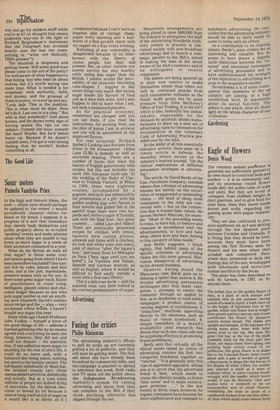Advertising
Facing the critics
Philio Kleinman
The advertising industry's efforts to pull its socks up are currently getting a lot of publicity, and they will soon be getting more. The first ads about ads have already been broadcast by commercial radio, and the campaign is planned to spread to television this week. Both radio and TV spots tell the public about the Independent Broadcasting Authority's system for vetting advertising and about how they can complain to the IBA if they think anything offensive has slipped through the net. Meanwhile arrangements are going ahead to raise £400,000 from the industry to strengthen the staff of the Advertising Standards Auth ority (which in practice is con cerned mainly with non-broadcast advertising) and to launch a cam paign, parallel to the IBA's, aimed at making the man in the street aware of the ASA's existence and of its willingness to receive complaints. The admen are being spurred on in their new resolve to make • themselves whiter than white not only by continued attacks from such consumerist militants as the Social Audit group• but by quiet pressure from John Methven's Office of Fair Trading. It is the OFT which is also, indirecfly but unmis takably, responsible for the decision by alcoholic drinks manu facturers to draw up a new set of advertising rules for themselves for incorporation in the voluntary Code of Advertising Practice presided over by the ASA.
In the midst of all this essentially defensive activity there pops up a timely article in Admap, the monthly which serves as the industry's learned journal, "On the ethical implications of different persuasion strategies in advertising." The article, by David Berdy of the Esso Petroleum company, reminds admen that criticism of advertising reposes not merely on the occurrence of exaggerated or misleading claims — the kind of thing most complaints to the ASA are concerned with — but on the conten tion that it fosters false values. He quotes Herbert Marcuse, for example: "Most of the prevailing needs to relax, to have fun, to behave and consume in accordance with the advertisements, to love and hate what others love and hate, belong to this category of false needs."
And Berdy suggests, I think rightly, that behind many of the specific criticisms of advertising claims lies this more general, Marcusean disapproval of advertising as the dreams business.
However, having stated the Marcusean case, Berdy goes on to sidestep it rather than answer it. He divides advertising persuasion techniques into four main cate gories: 1. attempts to coerce the consumer through an appeal to fear, as in deodorant or road safety campaigns; 2. product claims, of varying degrees of truthfulness; 3. "seduction" methods appealing directly to the emotions, such as music or visual symbolism; 4. simple reminders of a brand's availability (and research has shown that such non-claim ads can be surprising effective in promoting brand-preference). Berdy says that virtually all the ethical issues raised by critics of advertising concern his first two categories bracketed together as "rational." "It is generally only this type of aggressive approach, whose aim is to prove that the advertised brand is 'best,' which needs to create the identity models, to foster 'false needs' and to make extravagant promises . ." In the last twenty or thirty years, however, he argues, consumers have become far more sophisticated and resistant to
bombastic advertising. He coneludes that the advertising industrY should be able to fairly easily to come to terms with its critics.
As a contribution to an ongoing debate, 13erdy's piece strikes me as interesting and valuable. But he seems to have drawn a slightly facile distinction between the "rational" and emotional techniques of advertising persuasion and to have underestimated the strength of the objections to advertising as a prop to the acquisitive society. Nevertheless it is of some consequence that members of the ad industry are joining, at a high intellectual level, in arguments about its social function. The debate is one which, after all, sheds light on the whole character of our civilisation.


































































 Previous page
Previous page